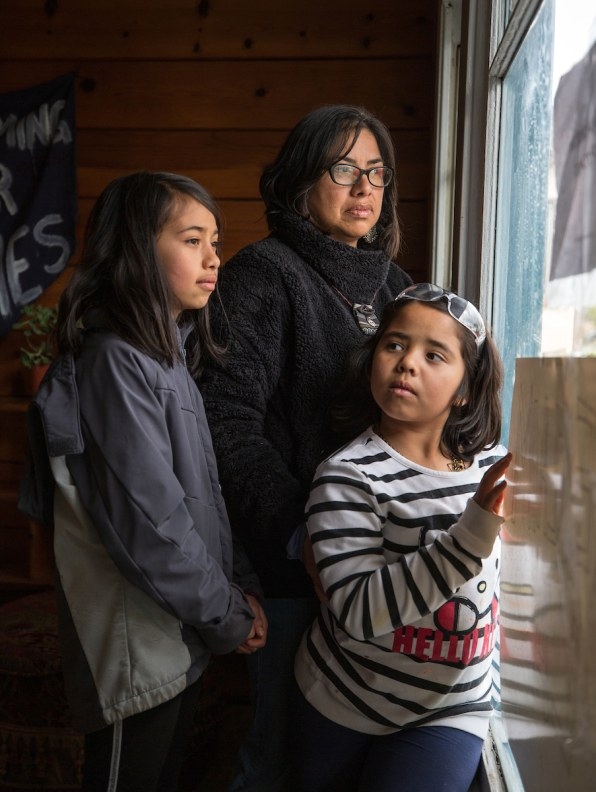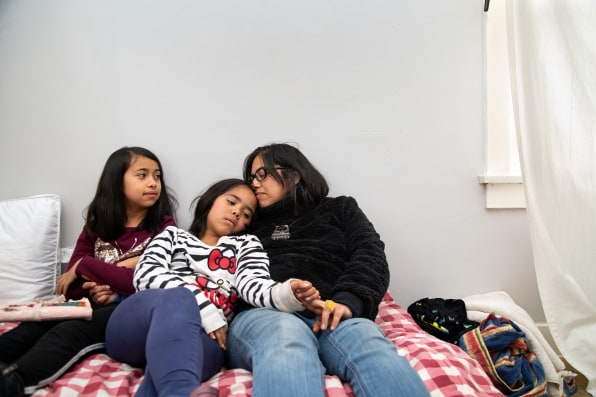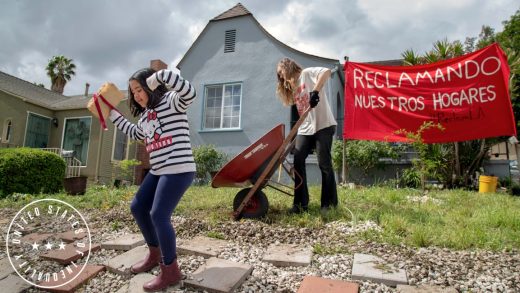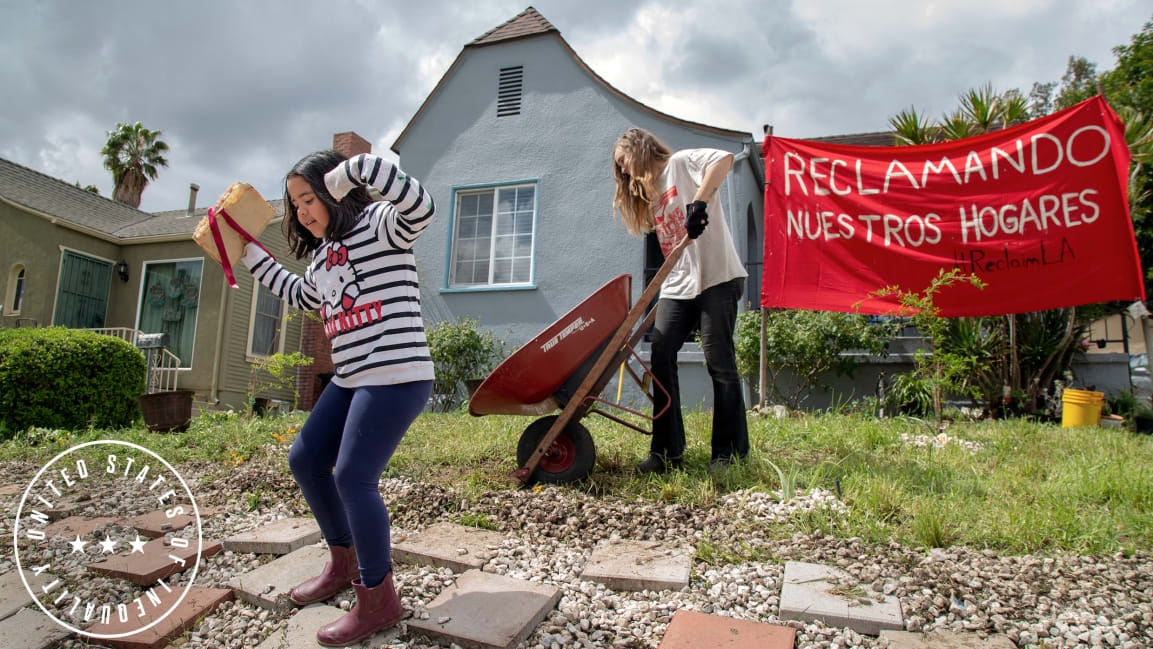In protest and for personal survival, homeless moms seize houses amid coronavirus crisis
Capital & Main is an award-winning publication that reports from California on economic, political, and social issues.
The red banner raised outside a modest suburban home in East Los Angeles was a dramatic new addition to the neighborhood. “Reclamando nuestros hogares,” it read in big block letters. It translates roughly as “Reclaiming our homes,” an explicit statement of protest and personal survival at a time of crisis on this quiet stretch of Sheffield Avenue.
Inside, Martha Escudero, 42, and her two young daughters, ages 8 and 10, were still settling in three days after the family and several community activists took control of the empty bungalow. The March 14 takeover was the first step in an ongoing campaign to provide shelter to homeless and housing-insecure Angelenos through the distribution of state-owned properties, just as the coronavirus pandemic reaches a crisis point.

[Photo: Steve Appleford/courtesy Capital & Main]
“We’re not squatters,” said Escudero, a former social worker who has been unable to afford to rent a home of her own since returning from living in Chile last year. “We’re retaining something that’s ours because it’s state-owned. We’ve been paying taxes all these years while they’re sitting vacant.”
Escudero was referring to the fact that the light-blue stucco home is one of 460 properties purchased by Caltrans decades ago for a now-abandoned plan to extend the 710 Freeway. About 200 of those properties sit empty today, including dozens in L.A.’s working-class El Sereno neighborhood, said community activist Roberto Flores, 72, a member of United Caltrans Tenants and Reclaim Our Homes. Caltrans rents out the remaining properties that it acquired.
The action taken by Escudero was inspired by Moms 4 Housing, a group of working mothers who took over a vacant house in West Oakland last November, amid a worsening housing shortage in the Bay Area. In East L.A., the multiple homes left empty by the state could no longer be ignored by housing activists.
“The most vulnerable people [living] on the streets—children in cars, the seniors—they need to be housed immediately,” said Escudero. “There’s enough housing for all these people. They need to work faster on this, especially now with this pandemic.”
Last Saturday morning Escudero entered the two-bedroom home that had been forcibly entered the previous night and left unlocked by supporters of the group. Later, volunteers helped load in tables, chairs and inflatable mattresses from a curbside U-Haul truck. Los Angeles Police Department officers were present but did not intervene.
One banner read: ‘Shelter in the Storm’
“I want to fix it. I want to fix the garden, the inside, and make it my home,” said Escudero. Soon after she moved in, the house had water service but no electricity.
In the days that followed, volunteers worked with shovels to turn the backyard into a garden, while others in front of the house planted pomegranate bushes as children played nearby. In the windows, messages placed beside a faded U.S. flag decal proclaimed: “Housing is a human right,” “Reclaim LA” and “Self-quarantine in process.”
On March 18, the group seized nine more Caltrans homes in the same neighborhood. At one house a new banner was raised: “Shelter in the Storm.”
“We know that three houseless people die on the streets of L.A. every single day,” declared pastor Stephen Cue Jn-Marie from the home’s front steps. “That was before the coronavirus.”
Among those taking the new homes were Ruby Gordillo, 33, and her three children; and Benito Flores, 64; all had originally joined Escudero at the first house.
The group, with assistance from the Alliance of Californians for Community Empowerment (ACCE), had been planning these actions long before the virus became the urgent health emergency it is today, but its presence only made their cause more pressing, organizers say.
“Another tragedy has come to us that has exposed more of a need to get the families into a home,” said Roberto Flores, also a co-founder of a crucial community center, the Eastside Cafe.
California has one of the nation’s highest poverty rates and, according to a 2018 study from the U.S. Department of Housing and Urban Development, is home to a quarter of the nation’s homeless. In 2019, almost 59,000 homeless people were counted in L.A. County alone. Nearly 70 percent of them live on the street, in parks or other temporary spaces.
In a letter sent last weekend in response to the home seizures, California Assembly members Richard Bloom and David Chiu urged Gov. Gavin Newsom to “act boldly and rapidly,” and clear a path for the houses to be opened to “occupancy in a fair and systematic way.”
As members of the newly formed California Legislative COVID-19 Housing and Homeless Urgent Action Group, Bloom and Chiu noted that the virus only compounds the urgency of an existing crisis in homelessness. The Democratic legislators called for a moratorium on evictions, utility shutoffs and foreclosures.
Roberto Flores believes the letter to Newsom helped create an understanding that led LAPD responders to “stand down” after Escudero entered the house. But that successful first home seizure followed a tense night, during which the group’s initial attempt to seize four homes hit a roadblock.
Last Saturday, at 4:30 a.m., a van with Escudero and her daughters backed up the driveway of a small single-family home. In the windows were signs reading: “Trespassing, loitering forbidden by law.” Yellow caution tape stretched across the back gate.
Three years ago I was paying $1,200 for rent for two bedrooms and now it’s over $2,000, and I can’t afford it.”
Martha Escudero
Prices for a small home in El Sereno typically start at $500,000, and this one had clearly been unoccupied for several years. Yet it wasn’t an eyesore, with a palm tree towering overhead and a lawn that had been trimmed at some point in the previous month.
Escudero and the kids quietly exited the van and began to unload some belongings, then the mother walked up the steps to the door. She reached for the handle. It was locked.
After a couple of minutes, everyone left, stopping at a nearby gas station for coffee. Suddenly a police cruiser roared past and toward the house with lights flashing and siren blaring. Soon a pair of police helicopters hovered above, shining a spotlight on the neighborhood.
Someone in the area had apparently alerted police to activity around the empty houses—it was only by chance that Escudero and her family were not inside the house when the police arrived. Before sunrise, two men were stopped and cited for misdemeanor trespassing in connection with Saturday’s actions.
The activists successfully took control of a different house the next morning, and Escudero moved in. They celebrated with an interfaith vigil that included Christian ministers, a rabbi and a member of the Native American spiritual community. They sang “This Little Light of Mine” and other spirituals from the civil rights movement, along with Mexican folk songs.
“That was really uplifting,” said Escudero. “In all faiths, they were able to support us and state how immoral it is to have these vacant homes while people are suffering on the streets and do not have a home.”
‘I just try to do the best for my family’
Soft-spoken and dressed neatly in black, Escudero does not fit the easy stereotype of a homeless person. She earned a degree in gender and ethnic studies at Cal Poly Pomona, and she spent part of the day before Saturday’s home seizure at a public library.
Beside her was a stack of Harry Potter books for her 10-year-old, Victoria.
Looking toward the night that lay ahead of her, she said, “I have a lot of mixed emotions. I am excited and a little nervous. I really don’t know what the outcome’s going to be, but I am hopeful the governor is going to empathize with this.”

A daughter of Mexican immigrants, Escudero grew up in East L.A. and South Los Angeles, while her father worked at Kaiser Aluminum in the City of Commerce.
“He’s been living here since the ’70s and he doesn’t speak English,” she said of her Teamster father. “He was a janitor [and] able to afford a house back in the day. I’m born and raised here in the United States, I have a college degree and I can’t afford to buy or rent a place here.”
She was politically active as a student, and involved in protests at South Central Farm, a celebrated and controversial community garden that stretched 14 acres in the heart of industrial Los Angeles. When the local farmers were evicted in 2006, Escudero was among the protesters detained at the bottom of a walnut tree where actress Daryl Hannah was also arrested.
“I feel strongly about a lot of things and I do my best to be involved, but I’m first and foremost a mom,” she said of her activism now. “I just try to do the best for my family.”
As a social worker, Escudero dealt with high-risk mothers: those suffering abuse, teenage moms, low-income women with mental health issues or other health problems. Even then, she had to use food stamps to make ends meet.
Escudero moved to Chile for two years with her daughters and their father, living a mostly quiet rural existence. When she returned to Los Angeles in 2019, her comfort level with the city had shifted.
“I had become accustomed to [a] slow pace and less people,” she recalled. “I had culture shock [in Los Angeles] and really bad anxiety, where I couldn’t get out of my house.”
Her parents already lost their home during the 2008 financial crisis and had separated. And homelessness in L.A. was now worse than she had ever seen: “The tents are all over. It’s not just on skid row anymore.”
With no full-time job, Escudero and the kids had to stay with her mother, among other relatives sharing a crowded apartment. Without that, Escudero said, she would be in a shelter or worse: “Three years ago I was paying $1,200 for rent for two bedrooms and now it’s over $2,000, and I can’t afford it.”
Last year, a friend from her time at South Central Farm connected her to Amy Schur, campaigns director of ACCE, a statewide organizing group supporting tenants’ rights, rent control and homeless issues. It was the first step Escudero took toward taking control of her own home.
“If the government can’t take responsibility and can’t do their job, then the community has to step up and do it for them,” Escudero said. “There’s so many people on the streets, and we could literally house everyone that’s homeless if we were able to get a hold of these public-owned houses and vacant lots. It’s unbelievable to me.”
The collection of empty homes in El Sereno emerged from an era of boom times for infrastructure and a more ruthless approach to eminent domain.
The state began buying homes, apartment buildings and empty lots in the area back in the 1950s, with plans to level everything for an extension of the 710 Freeway between Pasadena and Monterey Park. After six decades of legal challenges, environmental impact reports and a multitude of plans (placing the proposed extension both above-ground and underground), the 710 extension was finally killed in 2018.
Over the years, that has put the transportation agency in the role of landowner and landlord. According to Roberto Flores, Caltrans hasn’t been very good in that role.
“They’re slumlords,” he said. Some homes have mold, and others are simply dilapidated, while some tenants have been forced to leave. Caltrans did not respond to a request for comments for this story.
With the freeway extension dead, the agency’s uncertain stewardship of hundreds of homes originally set aside for the wrecking ball has left a large number of properties vacant at the very moment that housing shortages and homelessness are at their most acute.
The first house seized by Escudero and her little girls, followed by more families in another nine homes, could be the start of a new movement.
“So we’re there now and it’s been very good,” Flores added. “We’re just trying to talk to neighbors and explain to them what this is all about.”

(19)



